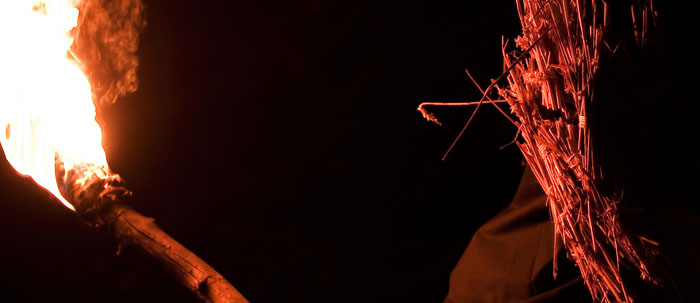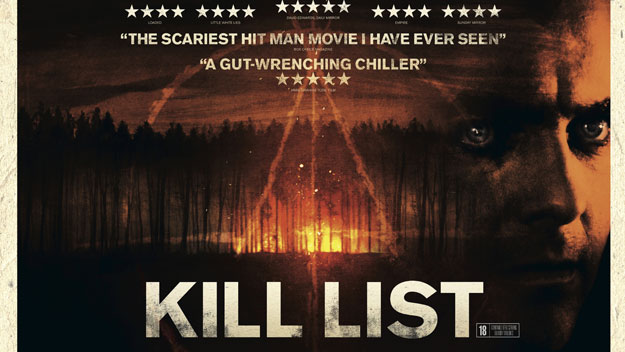
British writer-director Ben Wheatley got his start faking “real” videos on-line, which lead to him creating some fake-real videos for commercials and directing seasons (or series, as they’re called across the pond) of off-kilter BBC sketch shows Modern Toss and The Wrong Door. In 2009 he made the jump into feature films with Down Terrace (CHUD review), a Coen Bros-by-way-of-Mike-Leigh dark comedy that nabbed the Next Wave prize at Fantastic Fest. Wheatley’s current film, the much buzzed about hitman horror flick, Kill List, seems like an odd direction for someone who has been working in comedy. So I sat down with Mr. Wheatley for a 20-minute chat about comedy and horror and Kill List and Wheatley’s foreword thinking attitudes on the horror genre.
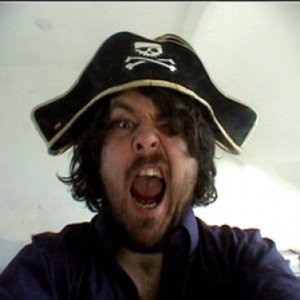 How many times have you seen the movie now?
How many times have you seen the movie now?
Jesus I have no idea.
Maybe a better question is when was the last time you actually sat through the whole thing?
I can’t remember the last time I watched it actually. I’ve been watching the end. Like the last half-hour. It’s good to get into – to feel the vibe of the room for the last half-hour.
You’ve primarily been doing comedy. You knew that you knew how to make people laugh. Down Terrace was a very dark, violent comedy, but was there any part of you that was nervous about diving so headlong into serious horror?
I did a lot of on-line viral stuff, which was making things that were fake camcorder stuff and making the visuals quite rough. And I don’t think [Kill List] was a massive step from Down Terrace, in many ways. It’s just extending that, slightly changing the flavor, the genre.
Given that you made a horror movie by your own volition, I have to assume you are a horror genre fan. What led you to make such a structurally unorthodox horror film?
It was just something I wanted to see, you know. After doing Down Terrace, where we were trying to make a crime film but it turned out different from [what one might expect], I figured I wanted to do the same thing with horror. I didn’t want to replicate too closely to what other people had done. And there was no point to that anyways — and that’s kind of what the problem is in the genre, photocopies, movies about movies about movies. And this thing where the monsters have become interchangeable, you know, with the maniac, the vampire and the zombie, with the same thing happening again and again and again, it loses a lot of soul. It’s not that kind of filmmaking; I don’t want to be those people who made those films back in the day. I’m my own person. So Amy [screenwriter Amy Jump] and I started thinking about what actually scared us, and worked backwards from that. That kind of dictated how the film was going to be, rather than thinking about the structures of other horror films. I did a thing a while back for Film4 [free digital television channel available in the UK] where I had to choose my favorite horror films, and they were things like Romero’s Dawn of the Dead and Texas Chainsaw Massacre but also stuff like Threads [read a CHUD related article], a British TV movie about a nuclear attack on Britain in the 80’s, and Ken Loach’s Ladybird, Ladybird, those movies to me are horror films but they don’t have people jumping out trying to cut people’s heads off, but they are as or more effective than stuff that’s got loads of blood. I like psychological horror as much as actual visual, visceral.
In a sense, it is easy to quickly scare people. To make a jump scare all you need to do is make things quiet, then goose the soundtrack loudly when something appears on screen. Kill List seems far more concerned with instilling a sense of dread. From a filmmaking perspective, how did you approach creating that atmosphere?
I think it is a few things. It’s this thing, like, once you’ve broken the expectations of the audience, in terms of how the plot is going to go — [Wheatley visualizes what he’s talking about now using his hands] generally in genre it starts off and the story is there and you’re there, and then by the time its here [he moves his movie-hand forward] you know exactly what’s going to happen and by the time its reached the first act, you’ve already finished the movie. But once you start fucking with that [displaces his hands to indicate the audience being out of line with the movie-hand], you’re only over here and you don’t know what’s coming and that makes you really, really tense. And then the other thing is like, dropping in scenes like the hammer thing [referring to a particularly gruesome scene in the film] it’s so horrible, you go, “Oh fuck. Is that going to happen again?” It just colors the rest of the movie. And because it’s gone from something that’s realistic to something that’s — there the major genre jump for me is when it goes from being a film to being a clip off the internet, or being like an execution film, and you go, “Oh fuck, he’s not going to cut away.” It’s all in the edit, and not the actual physical effect. Cause you’ve all seen it. It’s like Saw or Hostel or any of those things, jam-packed full of those kinds of effects, but they don’t have any impact on you because you’re attitude is like, “Well, yeah, bring it on! Murder them all!” But when you see it in the context of it being real, like they’re real people that you know about and are invested in, then the dread happens.
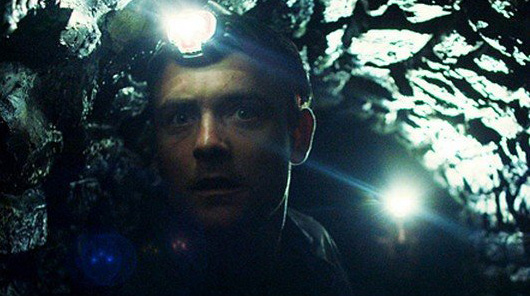
Music-wise we spent a lot of time on the 5.1 sound mix, so there is a lot of invisible stuff going on with sub-bass, lines of sub-bass moving backwards and forwards through the auditorium. If you’re watching in 5.1, in that space, the kind of physiological stuff, like making your intestines move, your heart and your lungs move, and vibrate — if you just listen to those sounds it will make you upset, even without the movie. But we did other physiological stuff, like going from very dark to very bright, so your irises are pinging up and down. Between that and your body being assaulted by sound, it is very unnerving.
That’s a very scientific approach.
Yeah. It isn’t just story and it isn’t just pictures. It’s everything. A full experience. And you’ve got to use it all to manipulate the audience into the emotions and the spaces you want them to get to. If you’re lucky enough to get your stuff shown in cinemas, then you want to use the whole thing instead of just some shitty stereo mix.
You were just talking about off-setting what people are expecting while watching the movie. In your mind, is this a movie that is contingent on surprise? Will spoilers kill the movie?
I guess, yeah. It just depends on what kind of film viewer you are. I mean, I wouldn’t have a problem, because I wouldn’t read any [spoilers]. I don’t read stuff before I go into films. I only read about bad films I don’t want to see. If it’s something that I actually want to see then I don’t. It’s like this madness of people reading scripts for films that aren’t even in production. I just cannot fathom it. It’s just extreme. Why would you do it to yourself? Totally ruin the experience of going to sit in the cinema? I don’t even really get why you’d search and search online, reading review after review of Kill List. I’d guess that you have your trusted reviewer, who you’ve gone to before, that you know isn’t going to just blurt it all out. I read [a Kill List review] the other day by, uh, some guy – I’m really struggling not to say who they are, because I’m so angry about it – but it was a review that was just describing what happened, followed by a couple lines of snide comments like, “Yeah, right.” Then more describing of what happened, then “Oh, yeah sure.” But that’s not a review, that’s a description. But it’s the internet, what can you do?
Comedy and horror are extremely similar. They are both sort of movie math –
Timing, yeah.
Exactly. Now I know you had worked with the principle cast members [Neil Maskell, Michael Smiley, MyAnna Buring, Emma Fryer] on your sketch show The Wrong Door. Had you seen any of them act this dramatically before you wrote Kill List? Cause from my perspective, in America, I’m just imagining someone making a dead serious fucked up horror-thriller with cast members from Saturday Night Live.
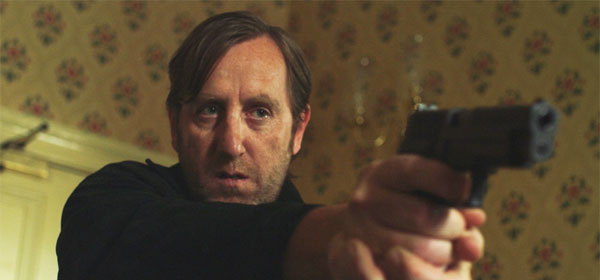
It’s weird. Neil came in [for The Wrong Door] and auditioned and he was great, so we used him. Then I looked him up on the IMDb and he’d done tons and tons of things. And he’s in the film The Football Factory, and he’s in loads of British crime movies, and he’s chilling in them. I mean, he’s really good. It reflects badly on my encyclopedic knowledge of horror, but MyAnna Buring came in and I cast her for The Wrong Door, and she was great. Then I looked her up on IMDb and she was in The Descent, and I thought, “Oh, yeeaaah. Of course she was!” And she was in Doomsday, another Neil Marshall film. And Neil Maskell is in another comedy show, playing multiple characters, and you wouldn’t even recognize him on the show from character to character. He even does American characters, which to my ear at least, are reasonably good.
What do you want an audience member feeling or thinking as they leave Kill List?
There’s different levels of it. I wanted to make a movie that as a horror film it will shake you. You will come out feeling something, horrified even kind of scared — the same way I felt watching films when I was a kid, when I watched films like The Excorsist or something like that and I’d think “Oh god, oh god!” On another level it is metaphoric readings about our responsibility in the war and blah blah blah which is in there; you could come out thinking about that. Or how films handle violence. Or how genre treats the hitman and why he gets an easy ride in most movies. And things like that.
I’m not going to ask you anything specific about the story, but as this is a movie that doesn’t give you answers –
I disagree. All the information is there, what it doesn’t do is summarize the information for you.
I would agree. But I’ve also seen some criticism floating around on-line from people who disagree, or are at least debating the meaning behind certain elements and scenes. You sort of just answered my question already right there, but I’ll toss out the question anyway, which is whether there is a complete backstory in your mind or if you purposefully left things shady, like the creators of Lost, who asked the audience to sort of write their own story, in a way.
Well, Lost is tough, cause that’s like 100 hours. This is only 90 minutes. I know what it means. And I’ve seen stuff on-line where people break it down and they get it right. That’s really reassuring. There’s two types of viewers for Kill List: the people who come out and say “That makes no fucking sense. I just don’t care.” They never think about it again, and they probably go through life like that. Then the other people come out and they actually think about it. The theory stuff I see on-line is 90% as we intended it. I always knew the audience was intelligent. And fuck you to those who don’t get it. I’ve got a reasonably inquiring mind. If I don’t understand something, I don’t blame the thing. Maybe I need to think about it. You don’t come out of Eraserhead and go, “His head was rubber all along? What the fuck?!” Fucking idiots.
Where there any certain films or filmmakers who – not like you were saying, “I want to be like this movie!” – but were things that you think informed you as far as tone or your approach to the material?
Yeah, English filmmakers like Alan Clarke, he did this movie Scum and The Firm – not the Tom Cruise version.
How would you describe that tone?
He’s kind of about going from family life to extreme realistic violence, and in and out of that. You feel you’re in the company of dangerous people. When you watch something like Scum you sit there with your hair up on end in fright. These are some of the scariest films anyone’s ever made, bar none. Clarke was a big influence. Then there is the sort of Cassavetes loose improvisation, realistic as much as you can with the performances. On the genre level there is stuff like Race with the Devil, with Warren Oates, that was a big influence. And that is a great example [of our topic of giving the audience all the answers]. It’s a great film, but they still have to stop off at a library for twenty minutes to look up satanism in books and have a conversation about it. Which is leaden and boring.
[In this vein I bring up the sudden ending to Kill List. We then start discussing the lengthy exposition epilogue to Psycho.]
You know the conversation they had on that one. “No one understands what – But why did he do it?” I always think of the end of The French Connection. They’re running around, he shoots another cop, and then they just kind of go to black. It is devastating. It doesn’t end with a court case. Or the end of Videodrome, which is fantastic.
What is it like having such a buzzed about film? Does it feel like a double-edged sword?
What can you do? Cause you need it. Otherwise no one will go see the film. On the face of it, it is a tiny-budgeted British film with no stars in it. Who the fuck is going to go see that in America? It’s just not going to happen. And I know that, because I did Down Terrace which twelve people went to see in Los Angeles in the run of a week. So I know what that’s like. Without buzz you’re done. Then buzz has its own thing, and you get this thing of people criticizing the buzz and reviewing reviews. But out of that massive bubble of bullshit you get a core audience who go and see it and like it. Then you get a chance of word of mouth, and you get a proper audience out of that.
